- Home
- David Eddings
The Rivan Codex Page 4
The Rivan Codex Read online
Page 4
‘It is the nature of man,’ I told her.
‘Curious creatures,’ she said, shaking her head.
‘What a wonder,’ Belkira marveled. ‘You have learned to converse with the beasts. Pray, dear brother, instruct me in this art.’
‘It is not an art,’ I said. ‘I took the form of a wolf on my journey. The speech of the wolf came with the form and remained. It is no great thing.’
And then we sat, awaiting the decision of our Master and his brother Gods regarding the wayward Torak. When they came down, their faces were solemn, and the other Gods departed without speaking with us.
‘There will be war,’ our Master told us. ‘My brothers have gone to gather their people. Mara and Issa will come upon Torak from the south; Nedra and Chaldan shall come upon him from the west; Belar and I will come upon him from the north. We will lay waste his people, the Angaraks, until he returns the Orb. It must be so.’
‘Then so be it,’ I said, speaking for us all.
And so we prepared for war. We were but seven, and feared that our Master might be held in low regard when our tiny number was revealed to the hosts of the other Gods, but it was not so. We labored to create the great engines of war and to cast illusions which confounded the minds of the Angarak peoples of the traitor, Torak.
And after a few battles did we and the hosts of the other peoples harry Torak and his people out onto that vast plain beyond Korim, which is no more.9
And then it was that Torak, knowing that the hosts of his brother Gods could destroy all of Angarak, raised up the jewel which my Master had wrought, and with it he let in the sea.
The sound was one such as I had never heard before. The earth shrieked and groaned as the power of the Orb and the will of Torak cracked open the fair plain; and, with a roar like ten thousand thunders, the sea came in to seethe in a broad, foaming band between us and the Angaraks. How many perished in that sudden drowning no one will ever know. The cracked land sank beneath our feet, and the mocking sea pursued us, swallowing the plain and the villages and the cities which lay upon it. Then it was that the village of my birth was lost forever, and that fair, sparkling river drowned beneath the endlessly rolling sea.
A great cry went up from the hosts of the other Gods, for indeed the lands of most of them were swallowed up by the sea which Torak had let in.
‘How remarkable,’ the young wolf at my side observed.
‘You say that overmuch,’ I told her, somewhat sharply.
‘Do you not find it so?’
‘I do,’ I said, ‘but one should not say it so often lest one be thought simple.’
‘I will say as I wish to say,’ she told me. ‘You need not listen if it does not please you; and if you think me simple, that is your concern.’
Who can argue with a wolf?—and a she-wolf at that?
And now were we confounded. The broad sea stood between us and the Angaraks, and Torak stood upon one shore and we upon the other.
‘And what now, Master?’ I asked Aldur.
‘It is finished,’ he said. ‘The war is done.’
‘Never!’ said the young God Belar. ‘My people are Alorns. The ways of the sea are not strange to them. If it be not possible to come upon the traitor Torak by land, then my Alorns shall build a great fleet, and we shall come upon him by sea. The war is not done. He hath smote thee, my dear brother, and he hath stolen that which was thine, and now hath he drowned this fair land in the death-cold sea also. Our homes and our fields and forests are no more. This I say, and my words are true, between Alorn and Angarak shall there be endless war until the traitor Torak be punished for his iniquities—yea, even if it prevail so until the end of days.’
‘Torak is punished,’ my Master said quietly. ‘He hath raised the Orb against the earth, and the Orb hath requited him for that. The pain of that requiting shall endure in our brother Torak all the days of his life. Moreover, now is the Orb awakened. It hath been used to commit a great evil, and it will not be used so again. Torak hath the Orb, but small pleasure will he find in the having. He may not touch it, neither may he look upon it, lest it slay him.’
‘Nonetheless,’ said Belar, ‘I will make war upon him until the Orb be returned to thee. To this I pledge all of Aloria.’
‘As you would have it, my brother,’ said Aldur. ‘Now, however, must we raise some barrier against this encroaching sea lest it swallow up all the dry land that is left to us. Join, therefore, thy will with mine and let us do that which must be done.’
Until that day I had not fully realized to what degree the Gods differed from men. As I watched, Aldur and Belar joined their hands and looked out over the broad plain and the approaching sea.
‘Stay,’ Belar said to the sea. His voice was not loud, but the sea heard him and stopped. It built up, angry and tossing, behind the barrier of that single word.
‘Rise up,’ Aldur said as softly to the earth. My mind reeled as I perceived the immensity of that command. The earth, so newly wounded by the evil which Torak had done, groaned and heaved and swelled; and, before my eyes, it rose up. Higher and higher it rose as the rocks beneath cracked and shattered. Out of the plain there shouldered up mountains which had not been there before, and they shuddered away the loose earth as a dog shakes off water and stood as a stern and eternal barrier against the sea which Torak had let in.
Sullenly, the sea retreated.
‘How remarkable,’ the wolf said.
‘Truly,’ I could not but agree.
And the other Gods and their people came and beheld that which my Master and his brother Belar had done, and they marveled at it.
‘Now is the time of sundering,’ my Master said. ‘The land which was once so fair is no more. That which remains here is harsh and will not support us. Take thou therefore, my brothers, each his own people and journey even unto the west. Beyond the western mountains lies a fair plain—not so broad perhaps nor so beautiful as that which Torak hath drowned this day—but it will sustain thee and thy people.’
‘And what of thou, my brother?’ asked Mara.
‘I shall return to my labors,’ said Aldur. ‘This day hath evil been unleashed in the world, and its power is great. Care for thy people, my brothers, and sustain them. The evil hath come into the world as a result of that which I have forged. Upon me, therefore, falls the task of preparation for the day when good and evil shall meet in that final battle wherein shall be decided the fate of the world.’
‘So be it, then,’ said Mara. ‘Hail and farewell, my brother,’ and he turned and the other Gods with him, and they went away toward the west.
But the young God Belar lingered. ‘My oath and my pledge bind me still,’ he told my Master. ‘I will take my Alorns to the north, and there we will seek a way by which we may come again upon the traitor Torak and his foul Angarak peoples. Thine Orb shall be returned unto thee. I shall not rest until it be so.’ And then he turned and put his face to the north, and his tall warriors followed after him.
That day marked a great change in our lives in the Vale. Until then our days had been spent in learning and in labors of our own choosing. Now, however, our Master set tasks for us. Most of them were beyond our understanding, and no work is so tedious as to labor at something without knowing the reason for it. Our Master shut himself away in his tower, and often years passed without our seeing him.
It was a time of great trial to us, and our spirits often sank.
One day, as I labored, the she-wolf, who always watched, moved slightly or made some sound, and I stopped and looked at her. I could not remember how long it had been since I had noticed her.
‘It must be tedious for you to simply sit and watch this way,’ I said.
‘It’s not unpleasant,’ she said. ‘Now and then you do something curious or remarkable. There is entertainment enough for me here. I will go along with you yet for a while longer.’
I smiled, and then a strange thing occurred to me. ‘How long has it been since you and I first met?�
� I asked her.
‘What is time to a wolf?’ she asked indifferently.
I consulted several documents and made a few calculations. ‘As closely as I can determine, you have been with me somewhat in excess of a thousand years,’ I told her.
‘And?’ she said in that infuriating manner of hers.
‘Don’t you find that a trifle remarkable?’
‘Not particularly,’ she said placidly.
‘Do wolves normally live so long?’
‘Wolves live as long as they choose to live,’ she said, somewhat smugly, I thought.
One day soon after that I found it necessary to change my form in order to complete a task my Master had set me to.
‘So that’s how you do it,’ the wolf marveled. ‘What a simple thing.’ And she promptly turned herself into a snowy owl.
‘Stop that,’ I told her.
‘Why?’ she said, carefully preening her feathers with her beak.
‘It’s not seemly.’
‘What is “seemly” to a wolf—or an owl, I should say?’ And with that she spread her soft, silent wings and soared out the window.
After that I knew little peace. I never knew when I turned around what might be staring at me—wolf or owl, bear or butterfly. She seemed to take great delight in startling me, but as time wore on, more and more she retained the shape of the owl.
‘What is this thing about owls?’ I growled one day.
‘I like owls,’ she explained as if it were the simplest thing in the world. ‘During my first winter when I was a young and foolish thing, I was chasing a rabbit, floundering around in the snow like a puppy, and a great white owl swooped down and snatched my rabbit almost out of my jaws. She carried it to a nearby tree and ate it, dropping the scraps to me. I thought at the time that it would be a fine thing to be an owl.’
‘Foolishness,’ I snorted.
‘Perhaps,’ she replied blandly, preening her tail feathers, ‘but it amuses me. It may be that one day a different shape will amuse me even more.’
I grunted and returned to my work.
Some time later—days or years or perhaps even longer— she came swooping through the window, as was her custom, perched sedately on a chair and resumed her proper wolf-shape.
‘I think I will go away for a while,’ she announced.
‘Oh?’ I said cautiously.
She stared at me, her golden eyes unblinking. ‘I think I would like to look at the world again,’ she said.
‘I see,’ I said.
‘The world has changed much, I think.’
‘It’s possible.’
‘I might come back some day.’
‘As you wish,’ I said.
‘Goodbye, then,’ she said, blurred into the form of an owl again, and with a single thrust of her great wings she was gone.
Strangely, I missed her. I found myself turning often to show her something. She had been a part of my life for so long that it somehow seemed that she would always be there. I was always a bit saddened not to see her in her usual place.
And then there came a time when, on an errand for my Master, I went some leagues to the north. On my way back I came across a small, neatly thatched cottage in a grove of giant trees near a small river. I had passed that way frequently, and the house had never been there before. Moreover, to my own certain knowledge, there was not another human habitation within five hundred leagues. In the house there lived a woman. She seemed young, and yet perhaps not young. Her hair was quite tawny, and her eyes were a curious golden color.
She stood in the doorway as I approached—almost as if she had been expecting me. She greeted me in a seemly manner and invited me to come in and sup with her. I accepted gratefully, for no sooner did she mention food than I found myself ravenously hungry.
The inside of her cottage was neat and cheery. A fire burned merrily upon her hearth, and a large kettle bubbled and hiccuped over it. From that kettle came wondrous smells. The woman seated me at the table, fetched me a stout earthenware plate and then set before me a meal such as I had not seen in hundreds of years. It consisted, as I recall, of every kind of food which I liked most.
When I had eaten—more than I should have probably, since as all who know me can attest, good food was ever a weakness of mine—we talked, the woman and I, and I found her to have most uncommon good sense. Though my errand was urgent, I found myself lingering, thinking of excuses not to go. Indeed, I felt quite as giddy as some adolescent in her presence.
Her name, she told me, was Poledra. ‘And by what name are you known?’ she asked.
‘I am called Belgarath,’ I told her, ‘and I am a Disciple of the God Aldur.’
‘How remarkable,’ she said, and then she laughed. There was something hauntingly familiar in that laugh.
I never learned the truth about Poledra, though of course I had suspicions.
When the urgency of my errand compelled me to leave that fair grove and the small, neat cottage, Poledra said a most peculiar thing. ‘I will go along with you,’ she told me. ‘I was ever curious.’ And she closed the door of her house and returned with me to the Vale.
Strangely, my Master awaited us, and he greeted Poledra courteously. I can never be sure, but it seemed that some secret glance passed between them as if they knew each other and shared some knowledge that I was unaware of.
I had, as I say, some suspicions, but as time went on they became less and less important. After a while, I didn’t even think about them any more.
That following spring Poledra and I married. My Master himself, burdened though he was with care and the great task of preparing for the day of the final struggle between good and evil, blessed our union.
There was joy in our marriage, and I never thought about those things which I had prudently decided not to think about; but that, of course, is another story.10
INTRODUCTION
My decision to publish this volume was made in part because of a goodly number of flattering letters I’ve received over the past several years. Some of these letters have come from students at various levels, and to make matters worse, I’ve also received letters from teachers who inform me that they’re actually encouraging this sort of thing. Aren’t they aware that they’re supposed to wait until I’m safely in the ground before they do this?
The students, naturally, ask questions. The teachers hint around the edges of an invitation to stop by and address the class. I’m very flattered, as I mentioned, but I don’t write—or grade—term papers any more, and I don’t travel. To put it idiomatically, ‘I ain’t going no place; I been where I’m going.’
Then there are those other letters, the ones which rather bashfully confide an intention to ‘try writing fantasy myself’. I don’t worry too much about those correspondents. They’ll get over that notion rather quickly once they discover what’s involved. I’m sure that most of them will eventually decide to take up something simpler—brain surgery or rocket science, perhaps.
I’d more or less decided to just file those letters and keep my mouth shut. A prolonged silence might be the best way to encourage a passing fancy to do just that—pass.
Then I recalled a conversation I had with Lester del Rey on one occasion. When I’d first submitted my proposal for the Belgariad, I’d expected the usual leisurely reaction-time, but Lester responded with what I felt to be unseemly haste. He wanted to see this thing—now, but I wasn’t ready to let him see it—now. I was in revision of what I thought would be Book I, and since I was still doing honest work in those days, my time was somewhat curtailed. I wanted to keep him interested, however, so I sent him my ‘Preliminary Studies’ instead—‘So that you’ll have the necessary background material.’ Lester later told me that while he was reading those studies, he kept telling himself, ‘There’s no way we can publish this stuff,’ but then he admitted, ‘but I kept reading.’ We were fairly far along in the Belgariad when he made this confession, and he went on to say, ‘Maybe when we’ve got the whole
story finished, we might want to think about releasing those studies.’
Eventually, the two ideas clicked together. I had people out there asking questions, and I had the answers readily at hand since nobody in his right mind takes on a multi-book project without some fairly extensive preparation. My Preliminary Studies were right there taking up space, I’d just finished a five-book contract, and I had nothing else currently on the fire. All this thing needed was a brief introduction and some footnotes, and we were off to press. (Just in passing I should advise you that my definition of ‘brief’ and yours might differ just a bit. It takes me a hundred pages just to clear my throat. Had you noticed that? I thought you might have.)
Please bear in mind the fact that these studies are almost twenty years old, and there are going to be gaps. There are places where some great leaps occurred, frequently flowing out of the point of my pen during that actual writing, and I wasn’t keeping a diary to report these bursts of inspired creativity. I’ll candidly admit that probably no more than half of these ‘strokes of genius’ actually worked. Some of them would have been disastrous. Fortunately, my collaborator was there to catch those blunders. Trial and error enters into any form of invention, I suppose. This book may help others to avoid some of the missteps we made along the way, and it may give the student of our genre some insights into the creative process—something on the order of ‘connect wire A to wire B. Warning! Do not connect wire A to wire C, because that will cause the whole thing to blow up in your face.’
Now that I’ve explained what I’m up to here, let’s get the lecture out of the way. (Did you really think I’d let you get away without one?)
After I graduated from the US Army in 1956, one of my veteran’s benefits was the now famous GI Bill. My government had decided to pay me to go to graduate school. I worked for a year to save up enough for some incidentals (food, clothing, and shelter) and then enrolled in the graduate school of the University of Washington in Seattle. (A good day in Seattle is a day when it isn’t raining up.) My area of concentration was supposed to be modern American fiction (Hemingway, Faulkner, and Steinbeck), but I had those Ph.D exams lurking out in the future, so I knew that I’d better spend some time with Chaucer, Shakespeare, and Milton as well. Once I’d mastered Middle English, I fell in love with Chaucer and somewhat by extension with Sir Thomas Malory.

 The Losers
The Losers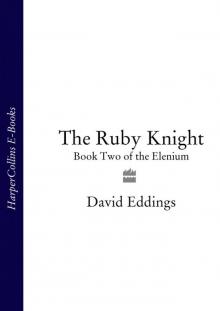 The Ruby Knight
The Ruby Knight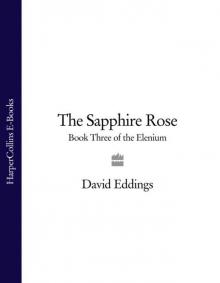 The Sapphire Rose
The Sapphire Rose King of the Murgos
King of the Murgos The Seeress of Kell
The Seeress of Kell Demon Lord of Karanda
Demon Lord of Karanda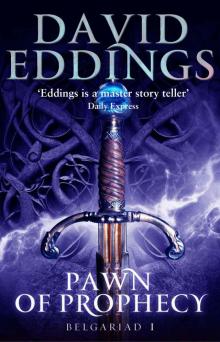 Pawn of Prophecy
Pawn of Prophecy Queen of Sorcery
Queen of Sorcery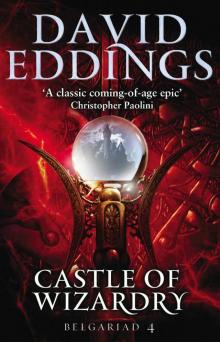 Castle of Wizardry
Castle of Wizardry Guardians of the West
Guardians of the West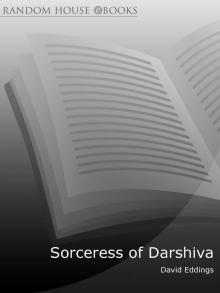 Sorceress of Darshiva
Sorceress of Darshiva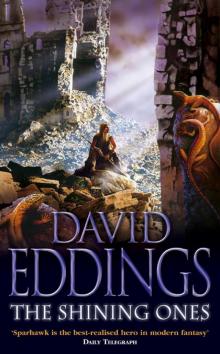 The Shining Ones
The Shining Ones Enchanters' End Game
Enchanters' End Game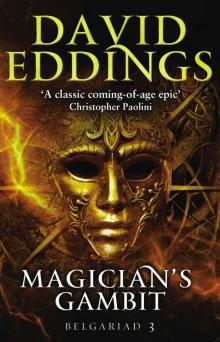 Magician's Gambit
Magician's Gambit High Hunt
High Hunt The Hidden City
The Hidden City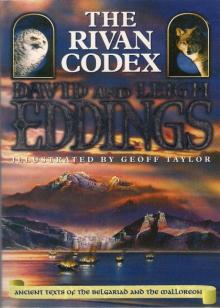 The Rivan Codex
The Rivan Codex Regina's Song
Regina's Song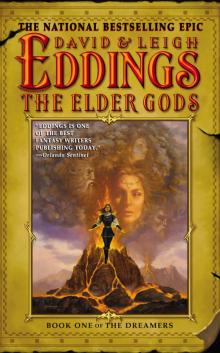 The Elder Gods
The Elder Gods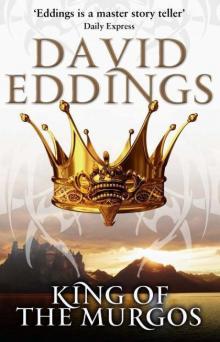 The Malloreon: Book 02 - King of the Murgos
The Malloreon: Book 02 - King of the Murgos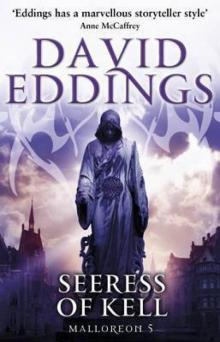 The Malloreon: Book 05 - Seeress of Kell
The Malloreon: Book 05 - Seeress of Kell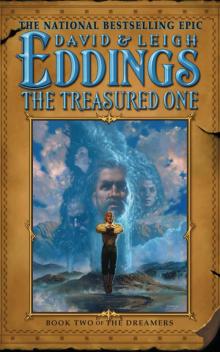 Treasured One
Treasured One The Malloreon: Book 04 - Sorceress of Darshiva
The Malloreon: Book 04 - Sorceress of Darshiva The Malloreon: Book 03 - Demon Lord Of Karanda
The Malloreon: Book 03 - Demon Lord Of Karanda Belgarath the Sorcerer and Polgara the Sorceress
Belgarath the Sorcerer and Polgara the Sorceress The Malloreon: Book 01 - Guardians of the West
The Malloreon: Book 01 - Guardians of the West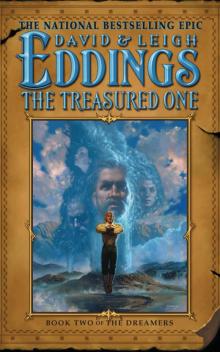 The Treasured One
The Treasured One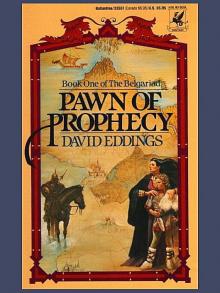 Pawn of Prophecy tb-1
Pawn of Prophecy tb-1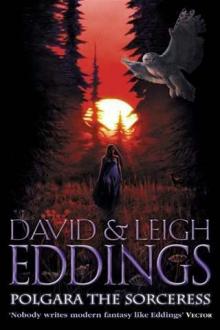 Polgara the Sorceress
Polgara the Sorceress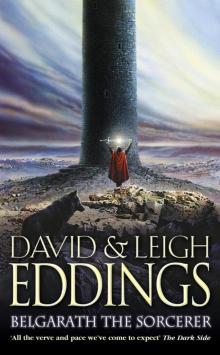 Belgarath the Sorcerer
Belgarath the Sorcerer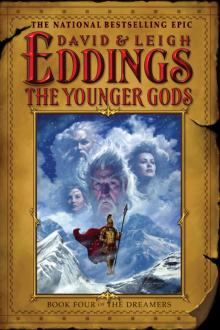 The Younger Gods
The Younger Gods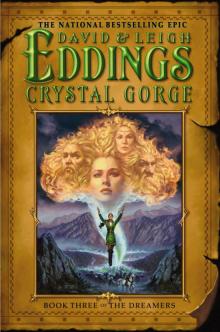 Crystal Gorge
Crystal Gorge